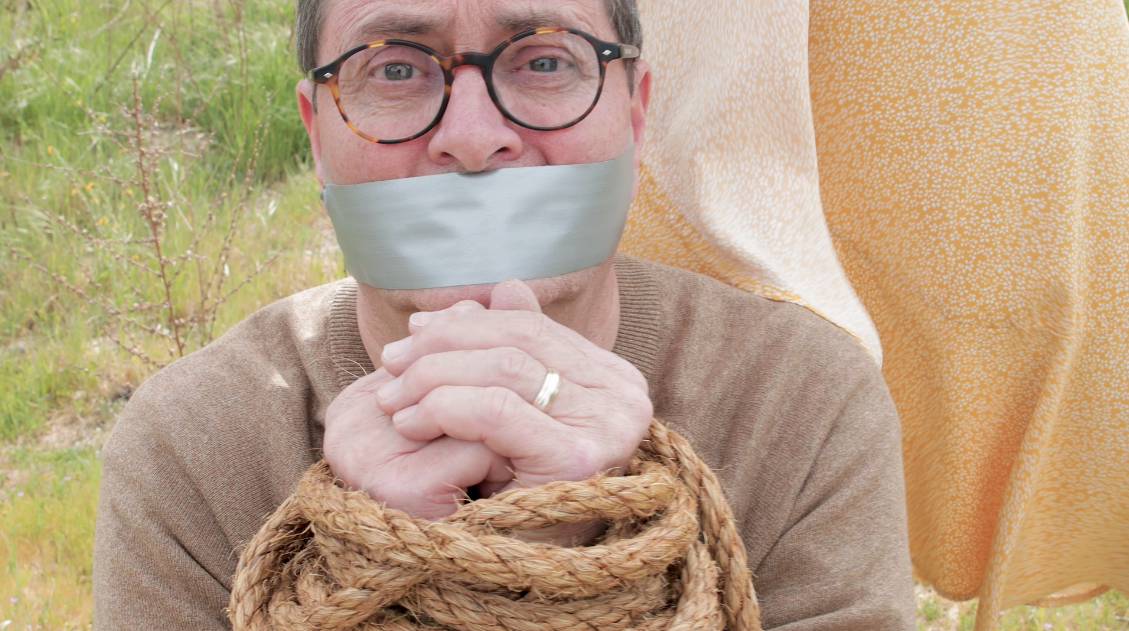
Today on TSL let’s take a look at camera moves. You know, camera moves can add or subtract from the emotion of what’s going on in the scene. So we’re going to analyze how to do different moves and create emotion with those moves. it’s important that the movement is in relation to something that’s happening in the scene – it can’t just be movement for movement sake, or it just feels unmotivated and it doesn’t strengthen the story. We want camera moves that create emotion and strengthen the story.
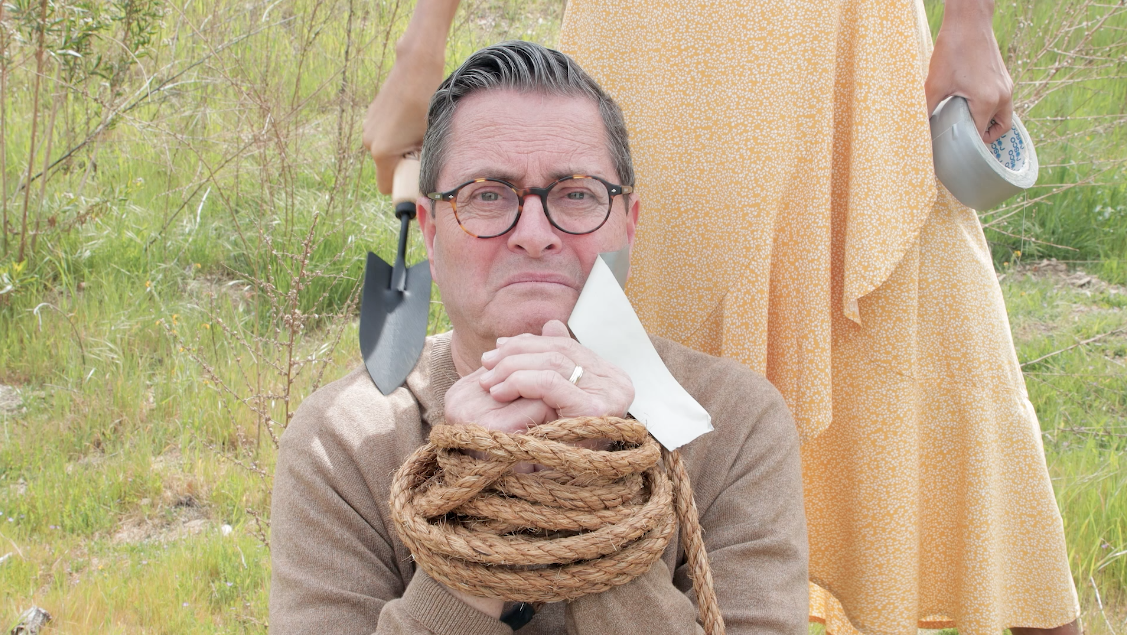
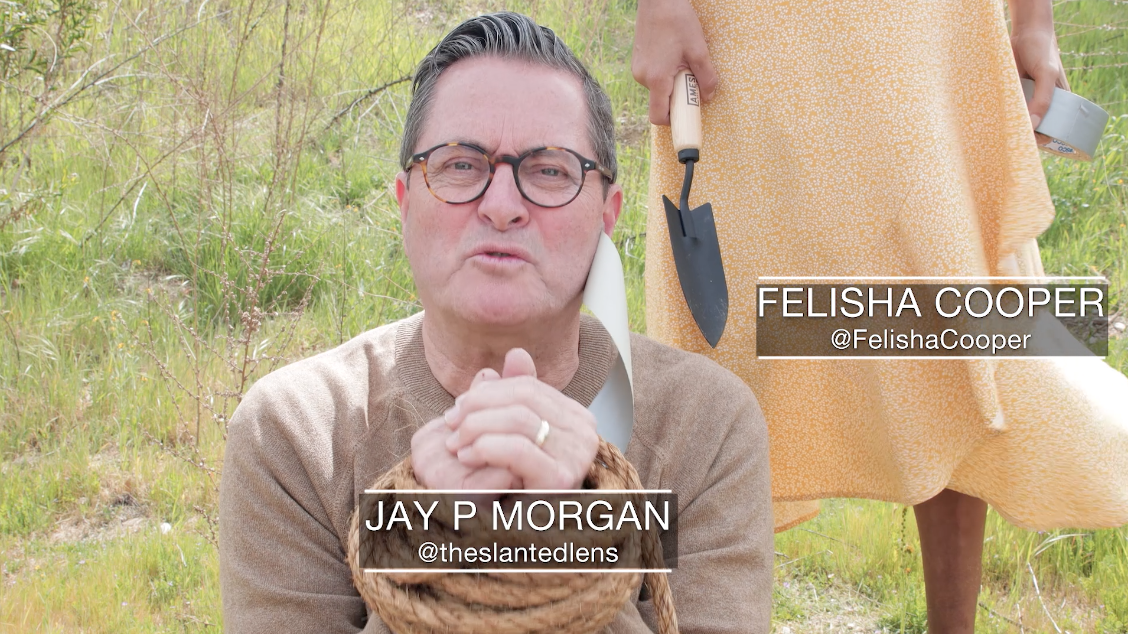
It’s really important to note that the actor, the way they’re dressed, the action that they’re doing, and the music that we’re hearing, have a lot to do with the emotion that we’re feeling. Those can very much overpower the camera move, but the camera move has it’s own narrative and it can also emphasize exactly what you’re seeing with your actor, with your music, and with the action on screen – when those all get together, you have a very strong story that communicates in the way it ought to.
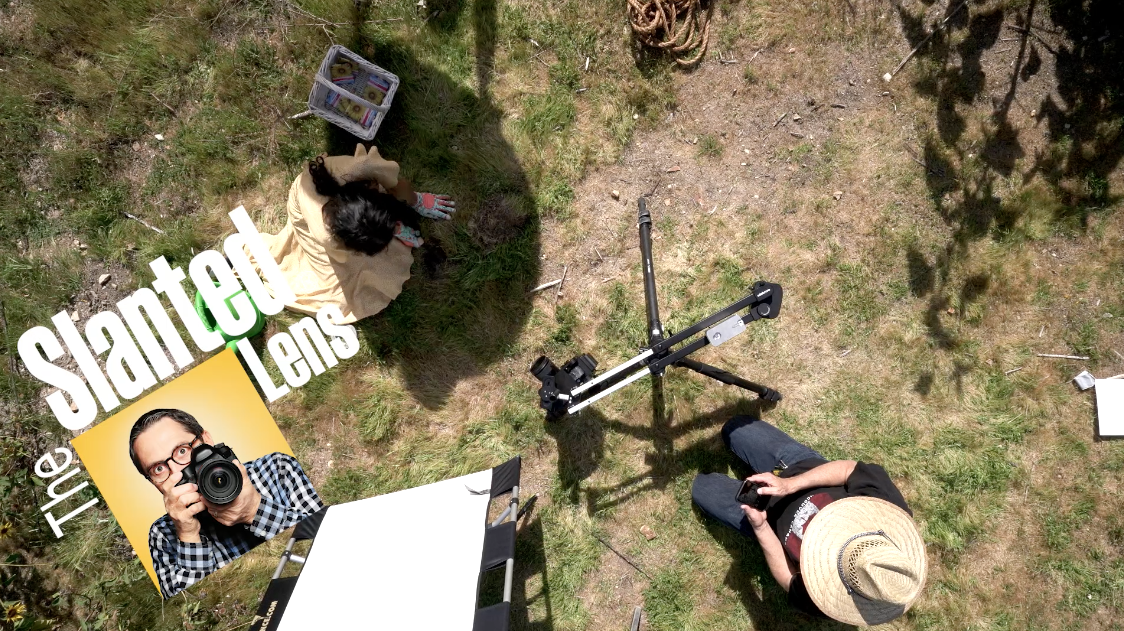
We’re using all edelkrone products today. We’re using the jibONE which is a great jib arm that’s automated. It can also work as a slider depending on the different position you put it in. And then on the jibONE we’ve got the headPLUS! Those 2 working together make it very simple because you simply put it where you want it to be – push the app and that becomes your first point. Then you move to the second point and set the second point on your app, and now you can just go back and forth between those 2 points without a problem. It goes from a horizontal move, to a diagonal move, to straight in move as well. It has 9 different positions where you can change the angles, so today we’re going to use that to be able to get the shots that we want to be able to communicate our story. If you want to see the story, go over to Instagram to see the finished video.
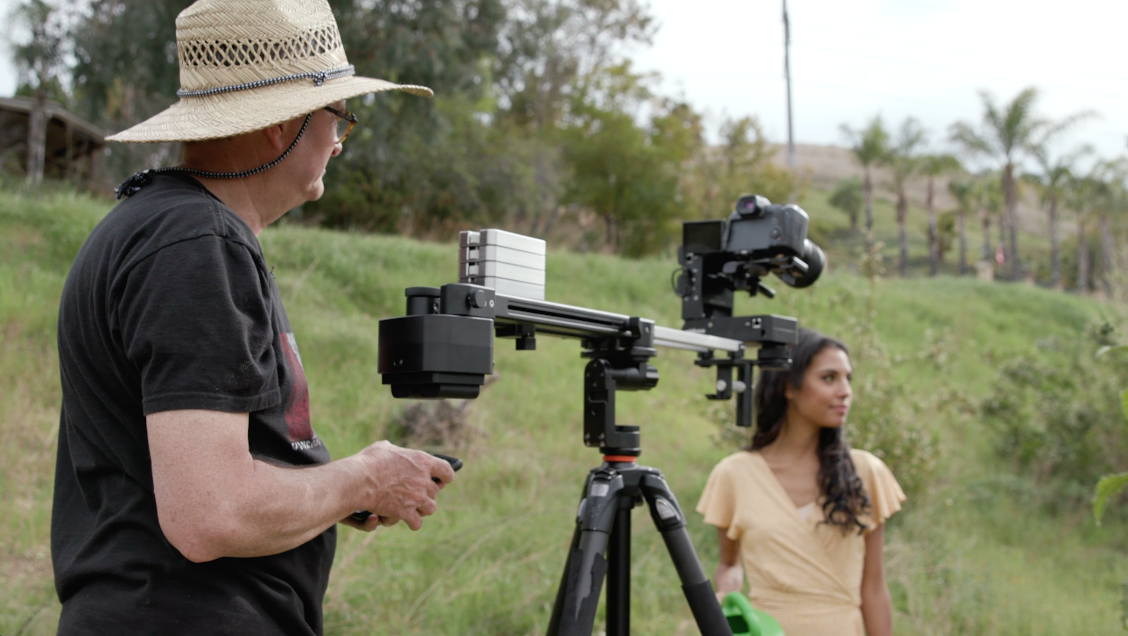
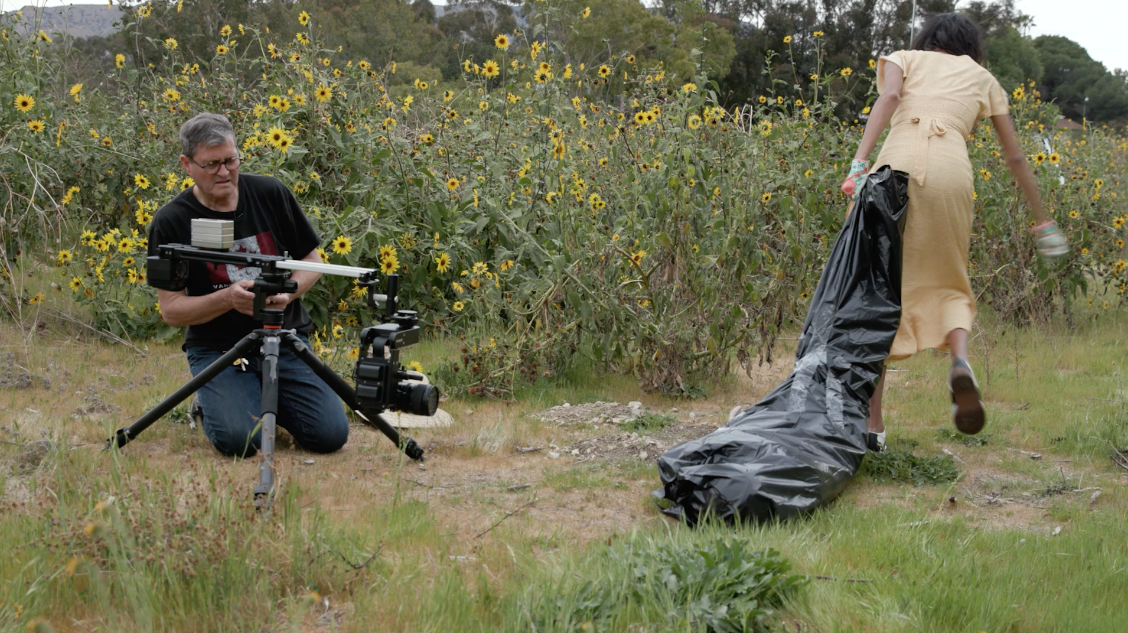
MOVES
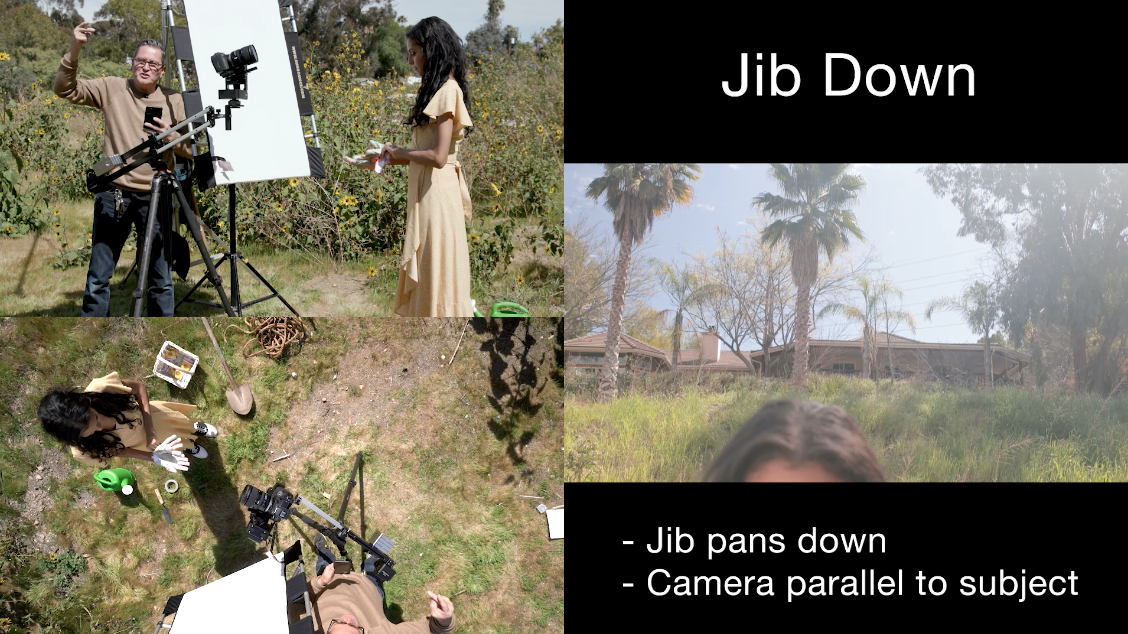
JIB DOWN
First move is kinda a jib in – kinda a drop in to the scene. I’m going to let it pass by her face because I want to give it a sense of who she is but I don’t want to reveal too much yet, but we’re really focused on the gloves. She’s putting the gloves on and then she’s stretching her fingers like she’s about to go out and go to work. on her garden.
I want it to be fairly slow because we’re giving a sense that she is calculated, methodical, and that she’s getting herself ready to go out in the garden and work.
PARALLAX MOVE
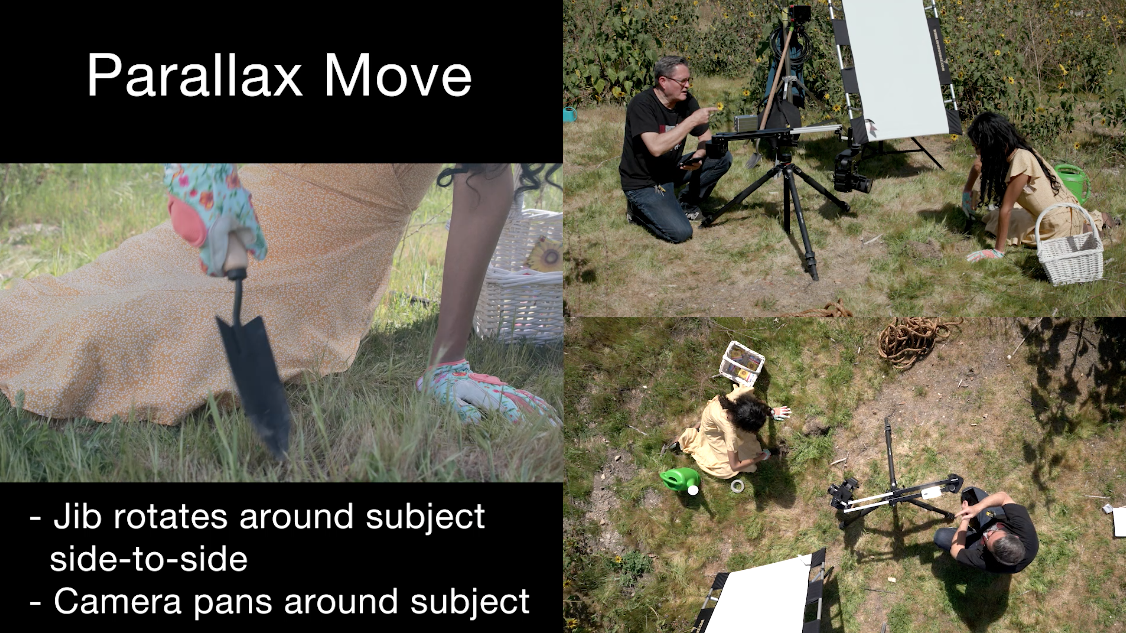
This next shot is a parallel move where we’re just going to swing around her while she’s digging. It’s just to establish the fact that she’s digging. And to keep that in the middle of the frame, I don’t want to just go by in a dolly shot, because a dolly shot will feel like we’re leaving the action. We don’t want to leave the action – This is going to set me up for my next shot. As I swing around I am staying with her because now I’m going to move into several moves back and show the dirt beginning to build up.
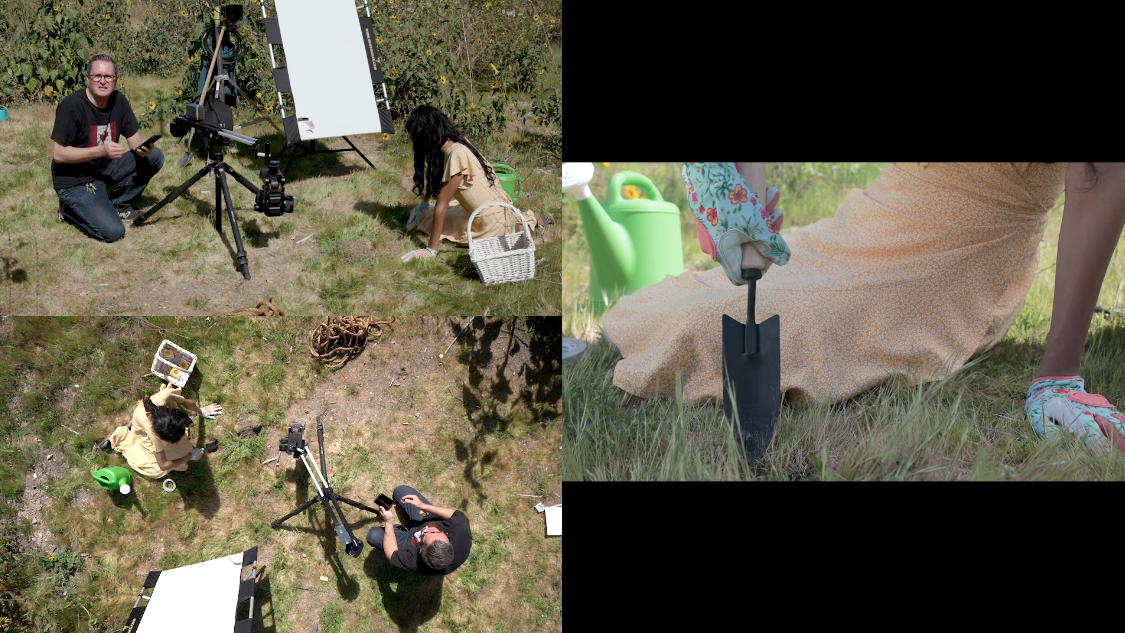
PULL BACK SHOT
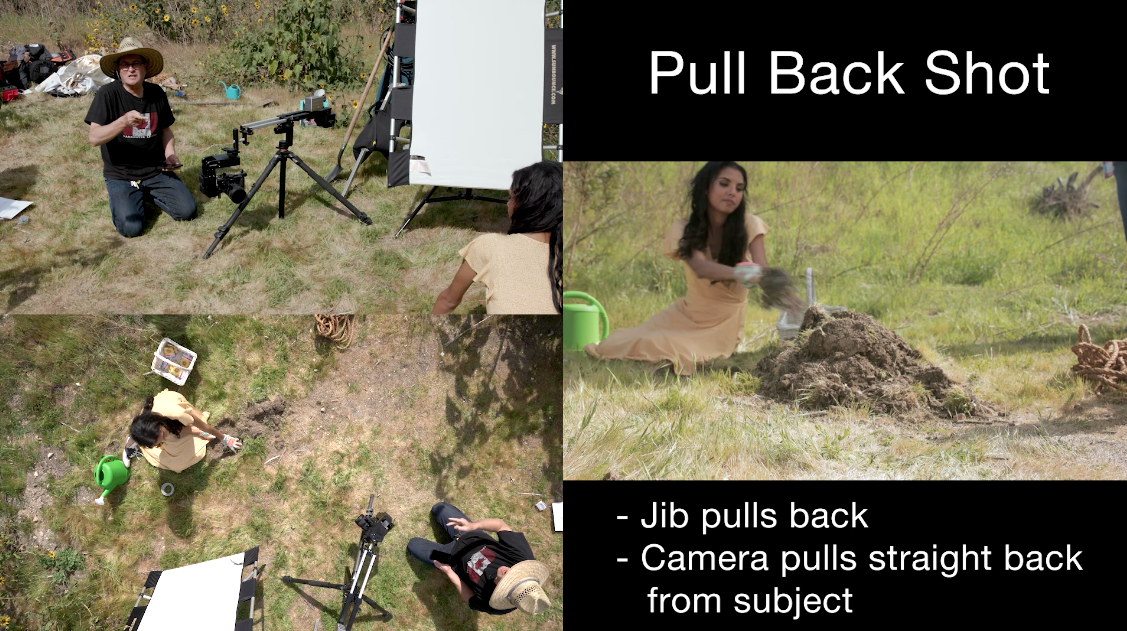
In this move I’m going to do a series of 3 slow pullouts. When you start on something and pull away from it slightly gives the audience a couple of emotions that start to happen. It’s telling them to look at the subject longer, it also gives a sense of abandonment like you’re leaving something – I want it to feel like we’re backing up and leaving the situation. As we do 3 pullbacks, we create more distance and become less connected to them.
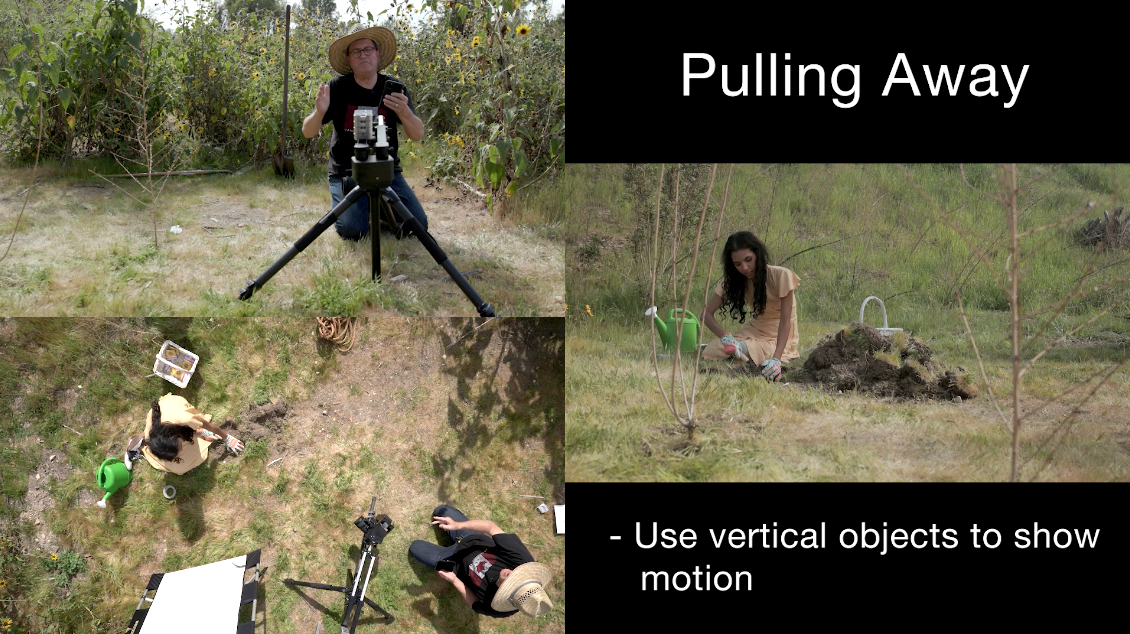
We’ve put these dead sticks in here because in order to show the movement backwards, we need some verticals. You have to be moving past verticals, or away from verticals, otherwise your frame’s not very alive.
SLIDER SHOT
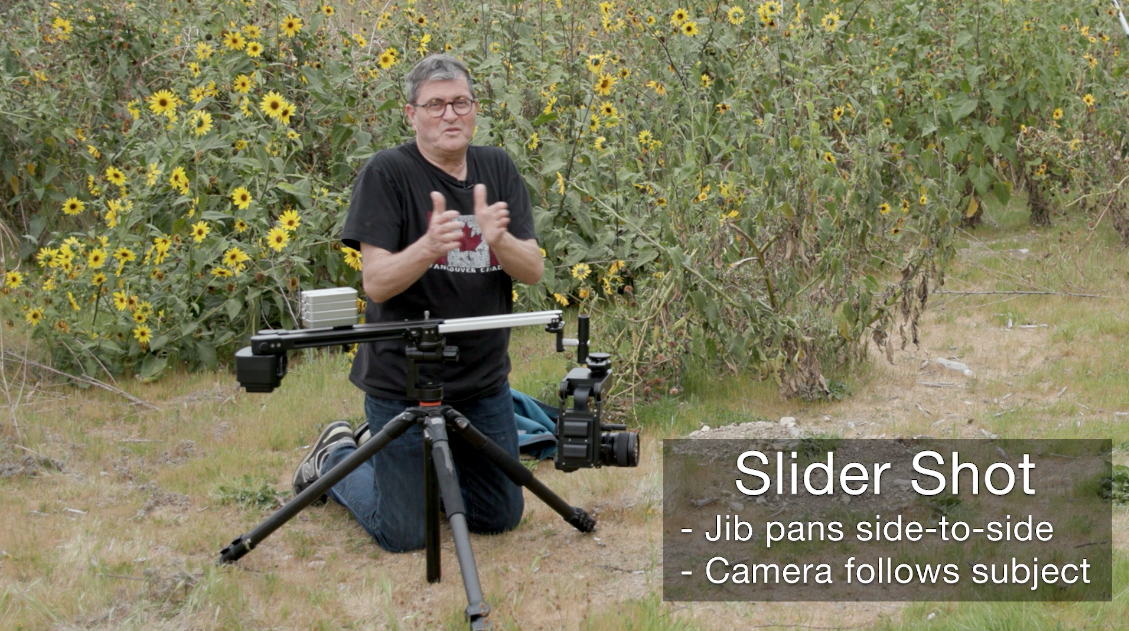
This next move is basically a dolly shot or a slider shot – I’m just going to move across and the idea is to stay just a bit in front of her just a little bit so that we don’t really see what’s going on until she brings the body in. So it’s starting to create a little anticipation – we don’t really see what’s happening until the camera slows down and the body comes into the frame. So it’s meant to be a little bit of a reveal and to change the emotion of the scene. She could be pulling a bag of fertilizer or a wheelbarrow, but then it’s a body and she pulls it across.
FLYOVER SHOT
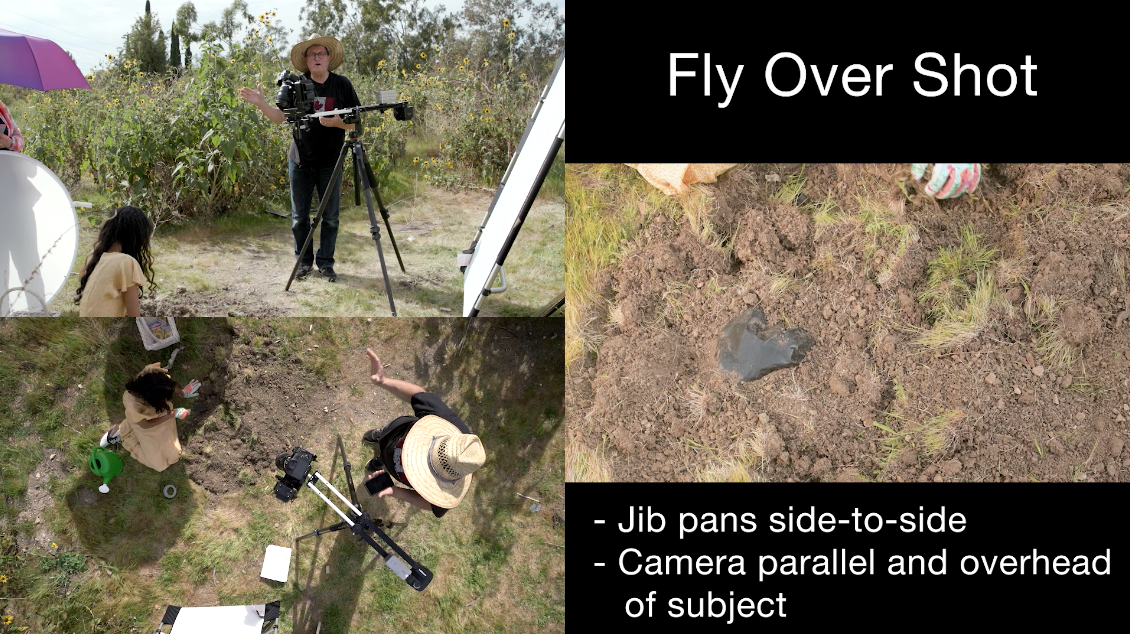
For this shot I’m just going to do a little fly away – that’s just a matter of revealing something. Something that you’ve put on a table or in this case, on the ground. You see just the final moments as she covers up the bag and it’s getting buried below. This established the fact that she’s finished her job.
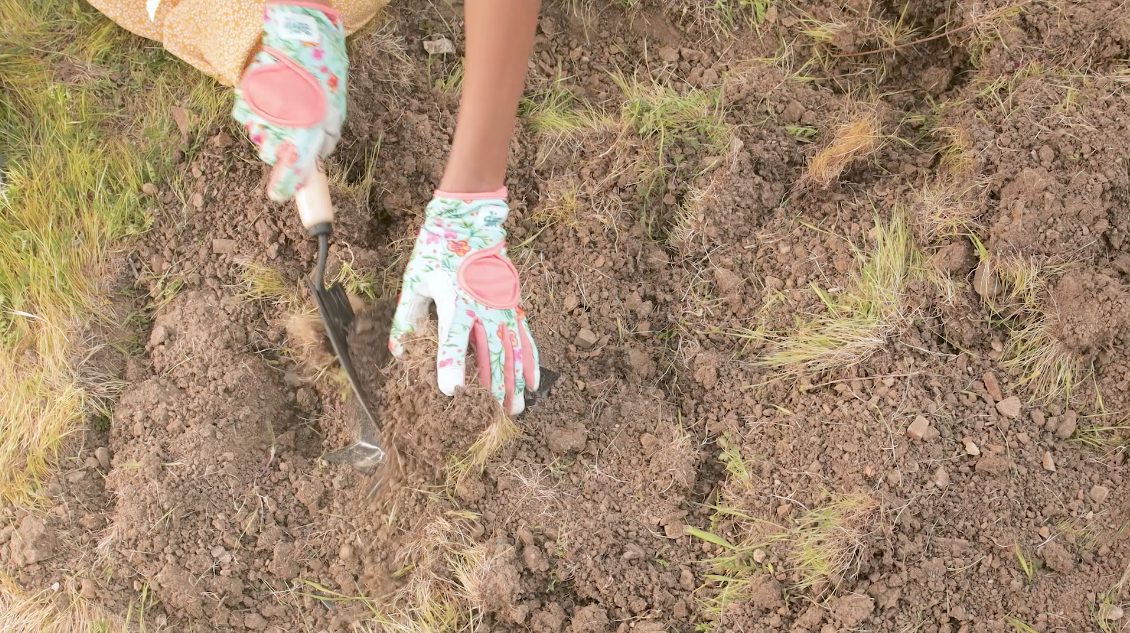
JIB DOWN SHOT
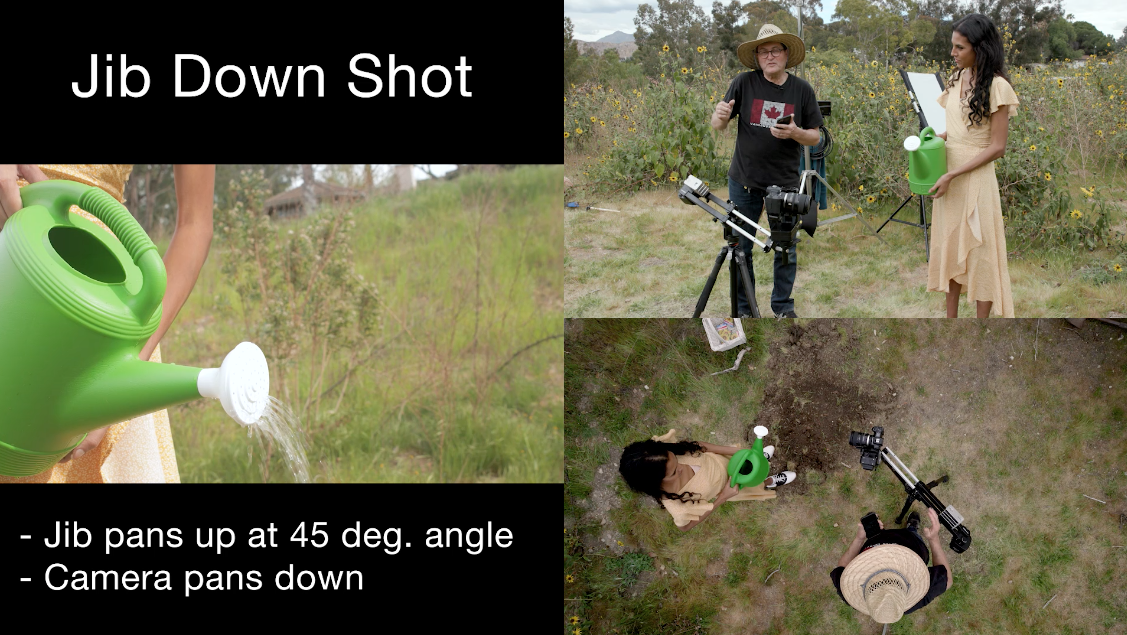
For this shot I’m going to have Felisha pouring the water and the camera is on a 45 degree angle and it’s going to come up, it’s a nice camera move to start on the can of water and pan in to showing us where she’s watering.
LOOK AWAY SHOT
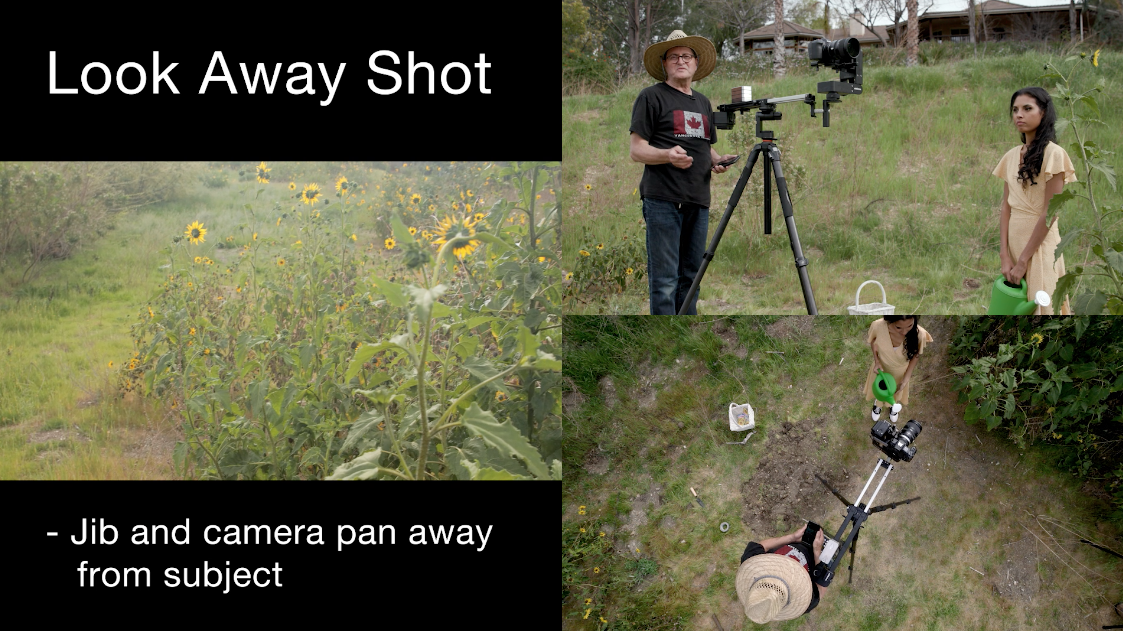
This is called a look away, the camera is going to drift away and follow our subject looking off into the distance and the camera moves past and drifts away. This can be taken a couple different ways, like the camera lost interest – Hitchcock used this where you knew the knife was about to stab but the camera drifts away and you don’t see it happen but you know what’s going on because there’s enough time that you realize that’s what’s happening there.
You don’t cut because you don’t know if it happens, but if you drift away and leave enough time, you know that it did happen. For us we’re just doing this look away as just a look to the sunflowers to realize what’s been going on this whole time. It really is the pay off for the entire piece that we shot.
CONCLUSION
You know when all of those work together, when you’ve got great camera moves that accentuate and direct the emotion that the actors are already giving and the scene is already giving to you, when those dance together it’s really a fabulous piece of art. And that’s the goal. You want the camera to be telling you the same thing the actor and the scene are telling you.
This can really change by how fast the camera moves as well. If we push in really hard, this is a really deliberate, slow look at camera moves and camera emotion because that was our story.
If you want to see the final story/film head to our Instagram @theslantedlens.
Special shoutout to all of our Patrons who are joining us on Patreon to grow their photography and skills and connecting on another personal level.
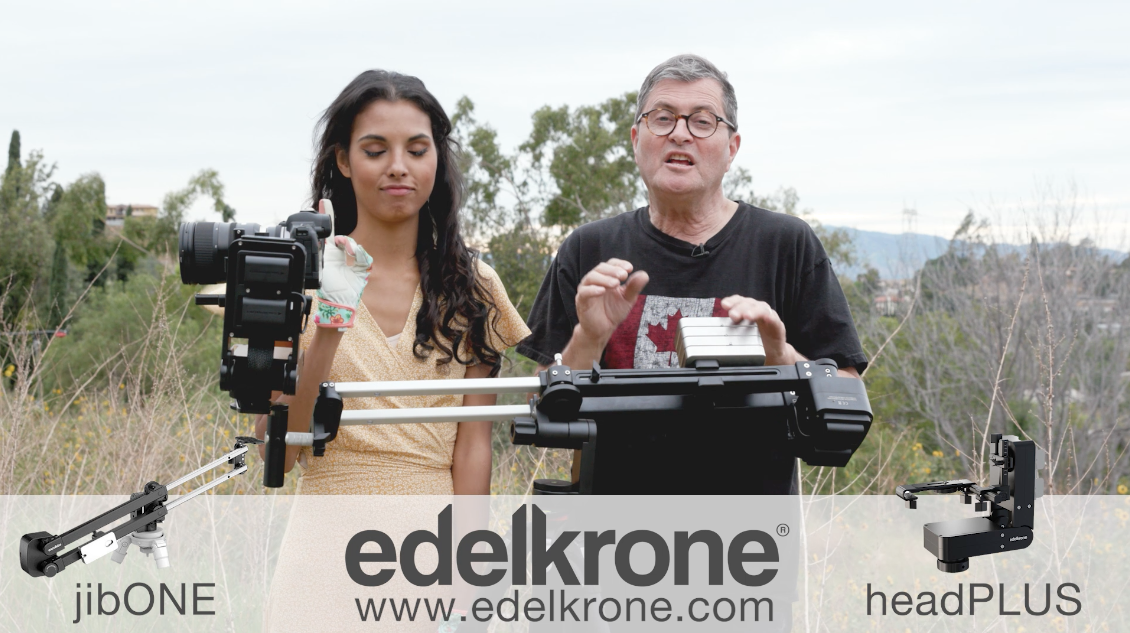
Big thanks to edelkrone for this fabulous piece of equipment to make this film happen. We really pushed the limits of this by using it out here in scenes like this, but it would work even more effectively on a set with products and things.
Keep those cameras rolling and keep on clickin!
GEAR USED:
edelkrone: https://edelkrone.com/
JibONE: http://edel.kr/jiblens
HeadPLUS: http://edel.kr/headlens
FlexTILT Head 2: http://edel.kr/fthlens
Canon C200
Samy’s Camera: https://shareasale.com/r.cfm?b=1498955&u=1207551&m=61234&urllink=&afftrack=
Canon 24-70 2.8
Samy’s Camera: https://shareasale.com/r.cfm?b=784055&u=1207551&m=61234&urllink=&afftrack
Sony A7 RIII
Samy’s Camera: https://shareasale.com/r.cfm?b=784055&u=1207551&m=61234&urllink=&afftrack
Canon EOS R
Samy’s Camera: https://shareasale.com/r.cfm?b=1492406&u=1207551&m=61234&urllink=&afftrack=
Tamron 24-70mm 2.8 G2
Samy’s Camera: https://shareasale.com/r.cfm?b=799819&u=1207551&m=61234&urllink=&afftrack=
Tamron 28-75 2.8
Samy’s Camera: https://shareasale.com/r.cfm?b=799850&u=1207551&m=61234&urllink=&afftrack=
Tamron 17-28 2.8
Samy’s Camera: https://shareasale.com/r.cfm?b=1498957&u=1207551&m=61234&urllink=&afftrack=
Vanguard VEO 2 Pro 263CPV
Samy’s Camera: https://shareasale.com/r.cfm?b=784055&u=1207551&m=61234&urllink=&afftrack
Blackrapid strap
Samy’s Camera: https://shareasale.com/r.cfm?b=1492410&u=1207551&m=61234&urllink=&afftrack=
Platypod
Samy’s Camera: https://shareasale.com/r.cfm?b=784055&u=1207551&m=61234&urllink=&afftrack
Spyder Color Checker
Samy’s Camera: https://shareasale.com/r.cfm?b=800647&u=1207551&m=61234&urllink=&afftrack=
Kobra Modifier
Samy’s Camera: https://shareasale.com/r.cfm?b=1492412&u=1207551&m=61234&urllink=&afftrack=